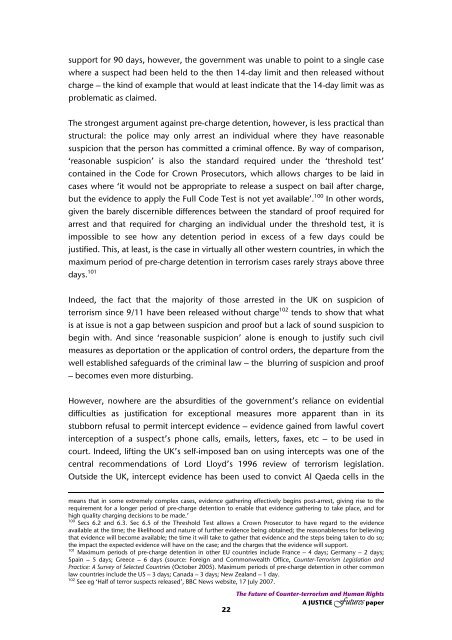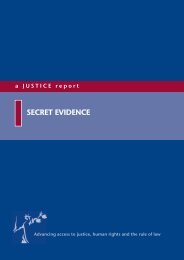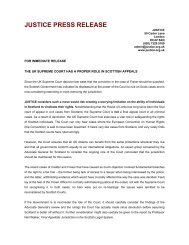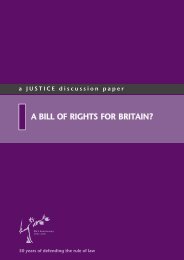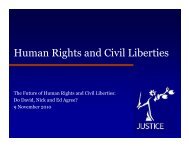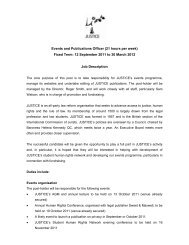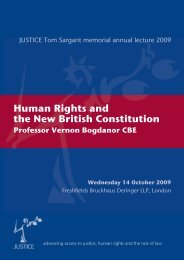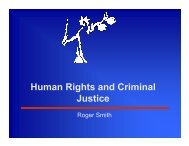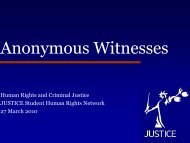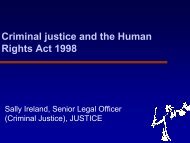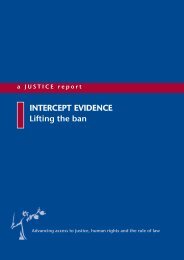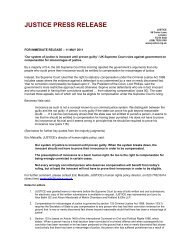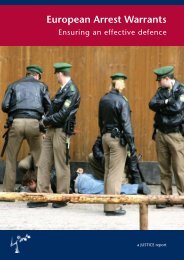The Future of Counter-terrorism and Human Rights - Justice
The Future of Counter-terrorism and Human Rights - Justice
The Future of Counter-terrorism and Human Rights - Justice
You also want an ePaper? Increase the reach of your titles
YUMPU automatically turns print PDFs into web optimized ePapers that Google loves.
support for 90 days, however, the government was unable to point to a single case<br />
where a suspect had been held to the then 14-day limit <strong>and</strong> then released without<br />
charge – the kind <strong>of</strong> example that would at least indicate that the 14-day limit was as<br />
problematic as claimed.<br />
<strong>The</strong> strongest argument against pre-charge detention, however, is less practical than<br />
structural: the police may only arrest an individual where they have reasonable<br />
suspicion that the person has committed a criminal <strong>of</strong>fence. By way <strong>of</strong> comparison,<br />
‘reasonable suspicion’ is also the st<strong>and</strong>ard required under the ‘threshold test’<br />
contained in the Code for Crown Prosecutors, which allows charges to be laid in<br />
cases where ‘it would not be appropriate to release a suspect on bail after charge,<br />
but the evidence to apply the Full Code Test is not yet available’. 100 In other words,<br />
given the barely discernible differences between the st<strong>and</strong>ard <strong>of</strong> pro<strong>of</strong> required for<br />
arrest <strong>and</strong> that required for charging an individual under the threshold test, it is<br />
impossible to see how any detention period in excess <strong>of</strong> a few days could be<br />
justified. This, at least, is the case in virtually all other western countries, in which the<br />
maximum period <strong>of</strong> pre-charge detention in <strong>terrorism</strong> cases rarely strays above three<br />
days. 101<br />
Indeed, the fact that the majority <strong>of</strong> those arrested in the UK on suspicion <strong>of</strong><br />
<strong>terrorism</strong> since 9/11 have been released without charge 102 tends to show that what<br />
is at issue is not a gap between suspicion <strong>and</strong> pro<strong>of</strong> but a lack <strong>of</strong> sound suspicion to<br />
begin with. And since ‘reasonable suspicion’ alone is enough to justify such civil<br />
measures as deportation or the application <strong>of</strong> control orders, the departure from the<br />
well established safeguards <strong>of</strong> the criminal law – the blurring <strong>of</strong> suspicion <strong>and</strong> pro<strong>of</strong><br />
– becomes even more disturbing.<br />
However, nowhere are the absurdities <strong>of</strong> the government’s reliance on evidential<br />
difficulties as justification for exceptional measures more apparent than in its<br />
stubborn refusal to permit intercept evidence – evidence gained from lawful covert<br />
interception <strong>of</strong> a suspect’s phone calls, emails, letters, faxes, etc – to be used in<br />
court. Indeed, lifting the UK’s self-imposed ban on using intercepts was one <strong>of</strong> the<br />
central recommendations <strong>of</strong> Lord Lloyd’s 1996 review <strong>of</strong> <strong>terrorism</strong> legislation.<br />
Outside the UK, intercept evidence has been used to convict Al Qaeda cells in the<br />
means that in some extremely complex cases, evidence gathering effectively begins post-arrest, giving rise to the<br />
requirement for a longer period <strong>of</strong> pre-charge detention to enable that evidence gathering to take place, <strong>and</strong> for<br />
high quality charging decisions to be made.’<br />
100 Secs 6.2 <strong>and</strong> 6.3. Sec 6.5 <strong>of</strong> the Threshold Test allows a Crown Prosecutor to have regard to the evidence<br />
available at the time; the likelihood <strong>and</strong> nature <strong>of</strong> further evidence being obtained; the reasonableness for believing<br />
that evidence will become available; the time it will take to gather that evidence <strong>and</strong> the steps being taken to do so;<br />
the impact the expected evidence will have on the case; <strong>and</strong> the charges that the evidence will support.<br />
101 Maximum periods <strong>of</strong> pre-charge detention in other EU countries include France – 4 days; Germany – 2 days;<br />
Spain – 5 days; Greece – 6 days (source: Foreign <strong>and</strong> Commonwealth Office, <strong>Counter</strong>-Terrorism Legislation <strong>and</strong><br />
Practice: A Survey <strong>of</strong> Selected Countries (October 2005). Maximum periods <strong>of</strong> pre-charge detention in other common<br />
law countries include the US – 3 days; Canada – 3 days; New Zeal<strong>and</strong> – 1 day.<br />
102 See eg ‘Half <strong>of</strong> terror suspects released’, BBC News website, 17 July 2007.<br />
22<br />
<strong>The</strong> <strong>Future</strong> <strong>of</strong> <strong>Counter</strong>-<strong>terrorism</strong> <strong>and</strong> <strong>Human</strong> <strong>Rights</strong><br />
A JUSTICE <strong>Future</strong>s paper


